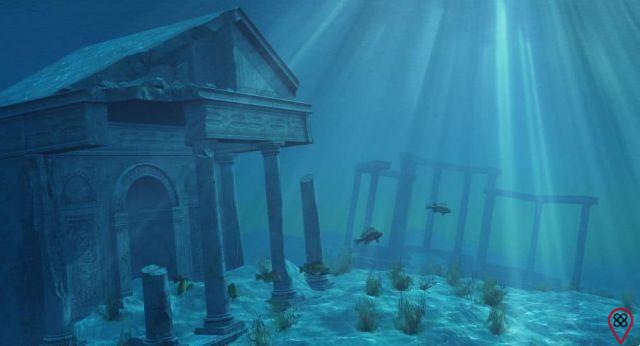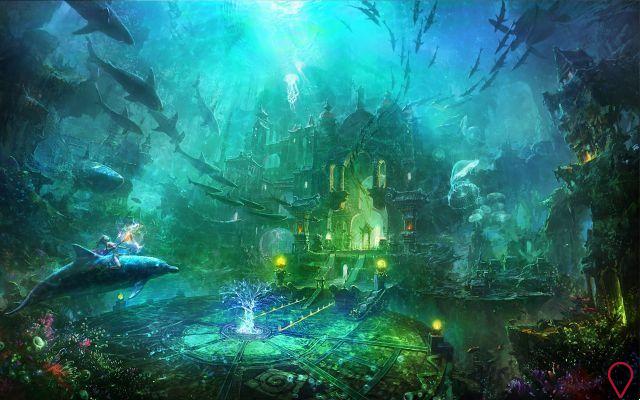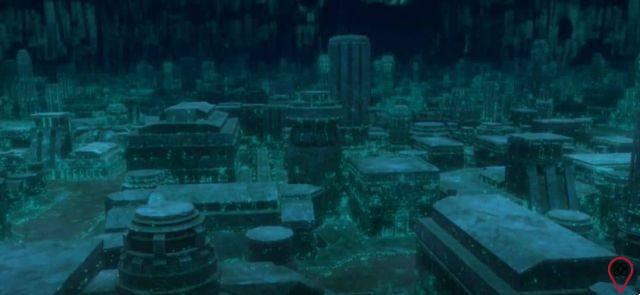Most people believe that the stories about Atlantis are nothing more than conspiracy theories or legends created to trigger the imagination of the population, because there are no records that prove that the place really existed, where it was located and how an entire island-city disappeared. , but there are hypotheses that Atlantis was in the Mediterranean Sea region and that its destruction was caused by the eruption of a gigantic volcano on the Island of Thera, in the Aegean Sea, probably in the XNUMXth century BC. of the volcano and its crater is a circle of islands now known as Santorini, Greece. In the story that gave rise to the legend, told by the philosopher Plato, however, Atlantis would be located beyond the Pillars of Hercules, in the Atlantic Ocean.

In 2012, in the area known worldwide as the Bermuda Triangle, a group of Canadian scientists claims to have discovered a lost city. Off the northwest coast of Cuba, 700 meters underground, an underwater robot took photographs of the ruins of buildings, four giant pyramids and a sphinx-like object. Experts believe the buildings belong to the pre-classical period of the Caribbean and Central American history from the same era; independent researchers insist that the ruins are from Atlantis. Archaeologists say that the buildings were built on earth and then submerged because of a natural catastrophe, however this hypothesis implies admitting the existence of a vast portion of land in the middle of the Atlantic in a remote geological epoch, an idea that reinforces the belief in Atlantis of Plato.

Lemuria, which would be located in the Indian Ocean, is an entire continent that has disappeared. The thoughts that incited the possible existence of a mysterious continent emerged in the mid-XNUMXth century, with Philip Lutley Sclater, a British zoologist and lawyer, and Ernst Haeckel, a German biologist, who were the first to start studying it, raising questions about the migrations of animals and humans. According to Ernst, there was a kind of “missing piece” when thinking about the transit of humans from Asia to Africa, as only a continental portion of land in the region could explain the ability of humanoids to move from one place to another. so far from another without crossing the ocean. Previously, Lutley had almost the same doubts as Haeckel, but thinking about lemurs: it was observed that there were many more of these animals in Madagascar than in Africa or India, and it could be concluded that they would have left one place and gone to another. .

Until modern times, much is speculated about these civilizations. To everyone's astonishment, in 2013, geologists found evidence that there could have been a continent in the region where Lemuria would be. It was located in the south of India, more precisely in Mauritius, a zircon dated to 3 billion years ago, a time when the island supposedly did not exist, since it is dated to 2 million years ago and only emerged thanks to the movement of the plates. tectonics. In this way, scientists claimed the existence of a huge portion of land there a long time ago, but it disappeared into the ocean about 84 million years ago. Today, the lost continent is called Mauritia, after the islands that now lie there. However, it was not possible to prove the legend of the Lemurians, fabulous hermaphroditic beings, with four arms, who would be, according to popular belief, the ancestors of the humans who inhabited Lemuria.
Speaking of real lost – and found – cities, the city of Alexandria was discovered in the Mediterranean Sea in 1998. Explorers found the ancient Egyptian city of Alexandria under water, virtually entire, even after being submerged for about 1.600 years. It is possible that she sank due to various natural disasters such as rising sea levels as well as earthquakes. There the divers found Cleopatra's royal palace, complete with marble floors, columns, ovens and basins, blocks of dressed limestone, walls and statues of Egyptian deities, as well as a dark gray granite sphinx; all items that should be part of the immense construction.
You might also like:
- Affective memories honor our ancestors
- The crystals in history
- Or great meaning of Yin Yang
Many cultures speak of mythical lands, sunken cities, and lost kingdoms that defy science to prove their theories and stories, and these mysterious civilizations drift in and out of the public interest, popularized on TV, in books, magazines, and now on the internet. It has become increasingly difficult to find anyone who has never heard of these regions or who has not even felt curious or encouraged to research more on the subject to find out if new discoveries have occurred. These places, whether real or not, demonstrate one thing: the way in which creativity, imagination and speculation are stoked by these stories stimulates a commendable critical and questioning development in the population, which is nonetheless beneficial for minds accustomed to receive ready-made information, with no interest in seeking to know more about a subject that may not even be true.

























